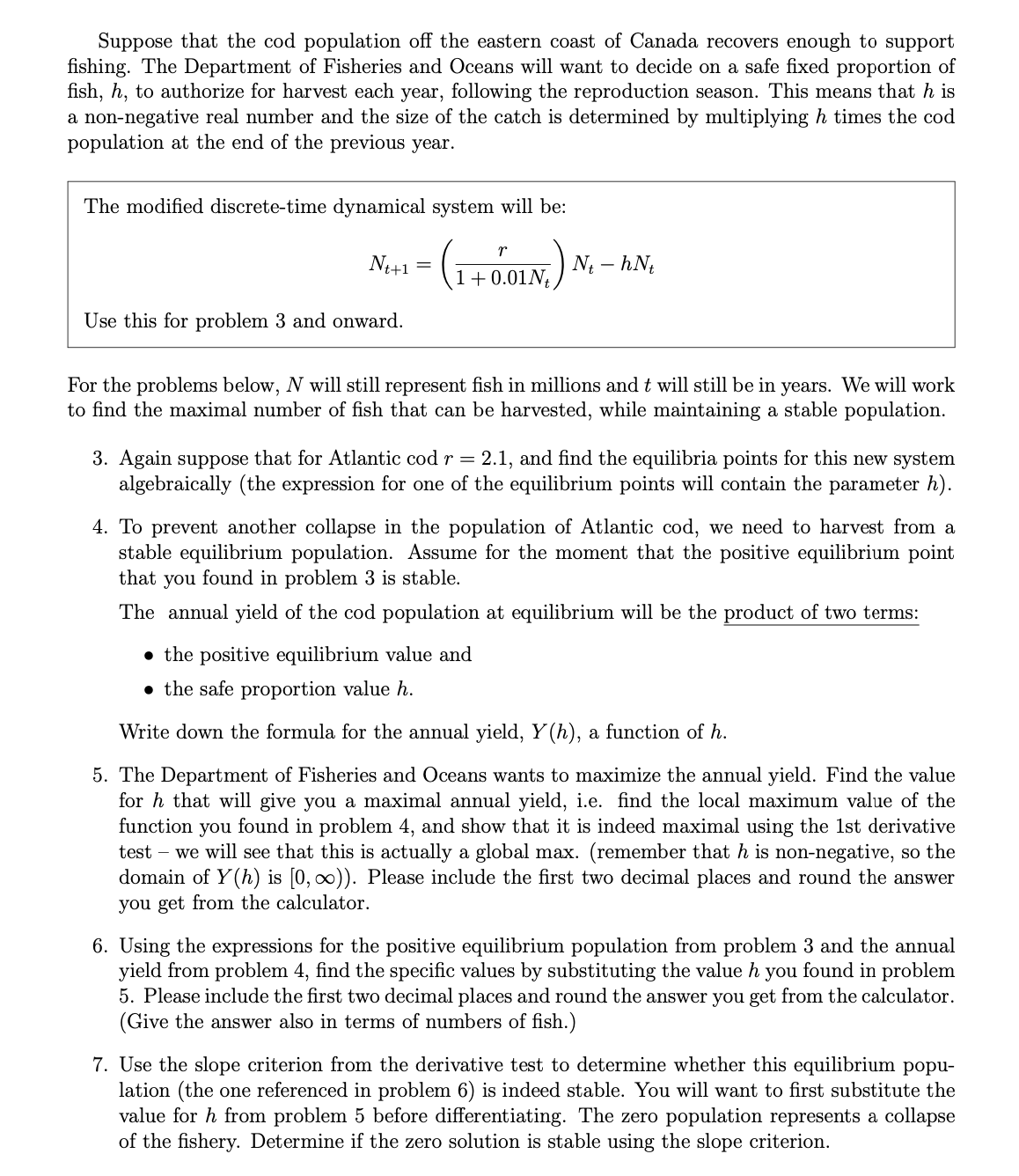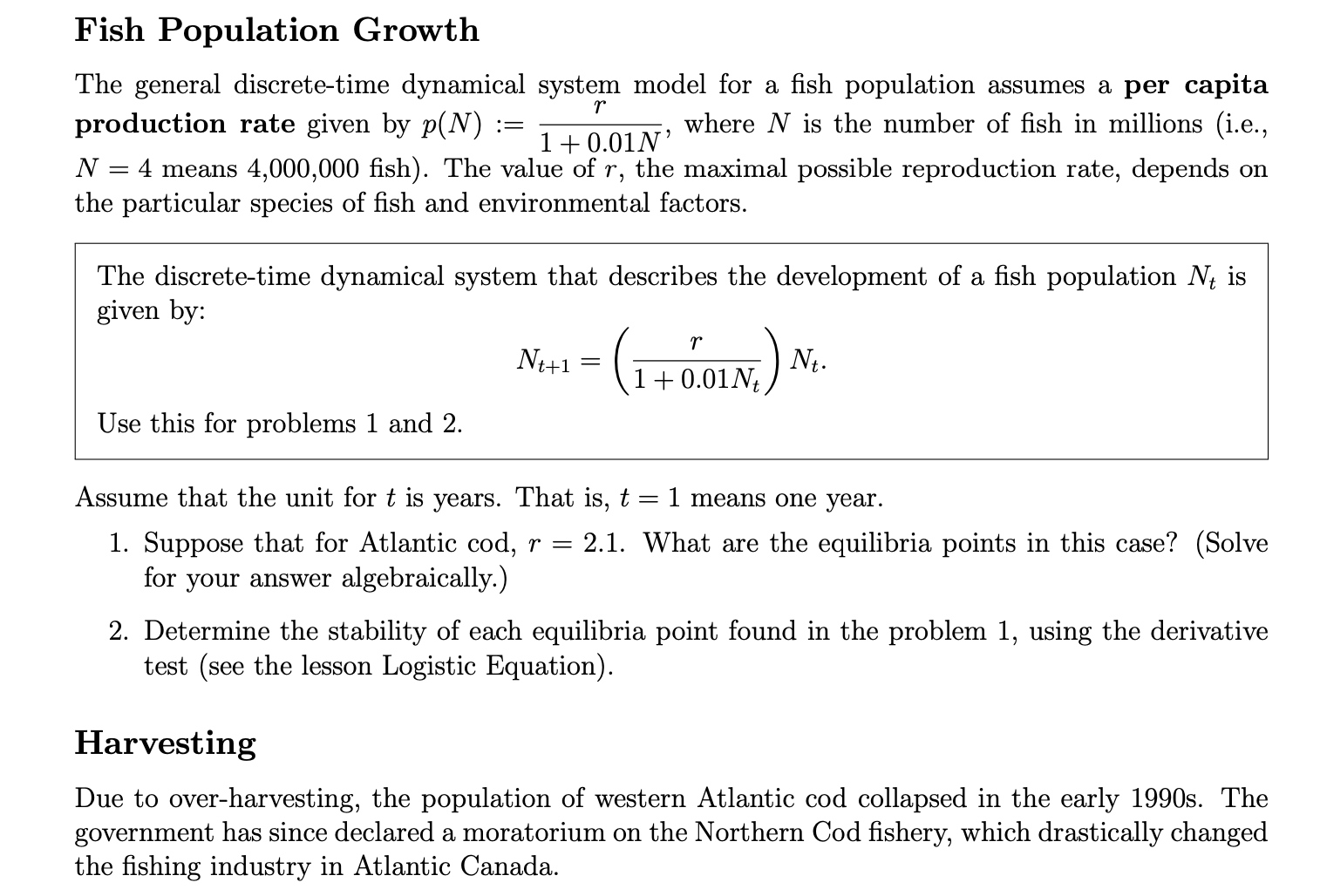Answered step by step
Verified Expert Solution
Question
1 Approved Answer
Suppose that the cod population off the eastern coast of Canada recovers enough to support fishing. The Department of Fisheries and Oceans will want


Suppose that the cod population off the eastern coast of Canada recovers enough to support fishing. The Department of Fisheries and Oceans will want to decide on a safe fixed proportion of fish, h, to authorize for harvest each year, following the reproduction season. This means that h is a non-negative real number and the size of the catch is determined by multiplying h times the cod population at the end of the previous year. The modified discrete-time dynamical system will be: Nt+1 = = (1+0.01%) N r Nt - hNt Use this for problem 3 and onward. For the problems below, N will still represent fish in millions and t will still be in years. We will work to find the maximal number of fish that can be harvested, while maintaining a stable population. 3. Again suppose that for Atlantic cod r = 2.1, and find the equilibria points for this new system algebraically (the expression for one of the equilibrium points will contain the parameter h). 4. To prevent another collapse in the population of Atlantic cod, we need to harvest from a stable equilibrium population. Assume for the moment that the positive equilibrium point that you found in problem 3 is stable. The annual yield of the cod population at equilibrium will be the product of two terms: the positive equilibrium value and the safe proportion value h. Write down the formula for the annual yield, Y(h), a function of h. 5. The Department of Fisheries and Oceans wants to maximize the annual yield. Find the value for h that will give you a maximal annual yield, i.e. find the local maximum value of the function you found in problem 4, and show that it is indeed maximal using the 1st derivative test - we will see that this is actually a global max. (remember that h is non-negative, so the domain of Y(h) is [0, )). Please include the first two decimal places and round the answer you get from the calculator. 6. Using the expressions for the positive equilibrium population from problem 3 and the annual yield from problem 4, find the specific values by substituting the value h you found in problem 5. Please include the first two decimal places and round the answer you get from the calculator. (Give the answer also in terms of numbers of fish.) 7. Use the slope criterion from the derivative test to determine whether this equilibrium popu- lation (the one referenced in problem 6) is indeed stable. You will want to first substitute the value for h from problem 5 before differentiating. The zero population represents a collapse of the fishery. Determine if the zero solution is stable using the slope criterion. Fish Population Growth r The general discrete-time dynamical system model for a fish population assumes a per capita production rate given by p(N) == where N is the number of fish in millions (i.e., N = 1 +0.01N' 4 means 4,000,000 fish). The value of r, the maximal possible reproduction rate, depends on the particular species of fish and environmental factors. The discrete-time dynamical system that describes the development of a fish population Nt is given by: Use this for problems 1 and 2. r No.1 = (1+0.01N) N. Nt+1 Nt Assume that the unit for t is years. That is, t = 1 means one year. 1. Suppose that for Atlantic cod, r = 2.1. What are the equilibria points in this case? (Solve for your answer algebraically.) 2. Determine the stability of each equilibria point found in the problem 1, using the derivative test (see the lesson Logistic Equation). Harvesting Due to over-harvesting, the population of western Atlantic cod collapsed in the early 1990s. The government has since declared a moratorium on the Northern Cod fishery, which drastically changed the fishing industry in Atlantic Canada.
Step by Step Solution
There are 3 Steps involved in it
Step: 1

Get Instant Access to Expert-Tailored Solutions
See step-by-step solutions with expert insights and AI powered tools for academic success
Step: 2

Step: 3

Ace Your Homework with AI
Get the answers you need in no time with our AI-driven, step-by-step assistance
Get Started


